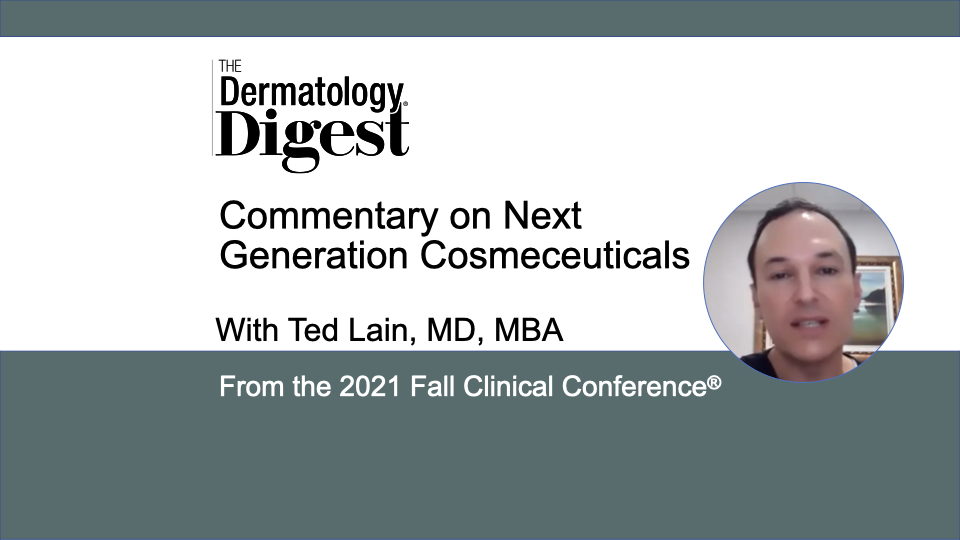Dr. Ted Lain discusses advancements in retinoic acid formulations, bio-retinols, and other molecular innovations in skincare.
From the 2021 Fall Clinical Dermatology Conference®
Ted Lain, MD, MBA, is a board-certified dermatologist practicing at Sanova Dermatology in Austin, Texas.
“[There are] lots of important innovations in the skincare space and all different categories of ingredients,” said Ted Lain, MD, who presented “New Options in Cosmeceuticals” at the 2021 Fall Clinical Dermatology Conference® in Las Vegas, Nevada.
Retinoids are a case in point. Different formulations have evolved to address characteristically harsh side effects that include dryness, redness, peeling, and sensitivity.
“When we look at tretinoin, for example, or retinoids, we have the traditional retinoic acid, we have the retinols, the retinaldehyde, and esterified forms of all of those.”
Today, molecular additions to retinoids are not only making products more tolerable but easier to use, he said, using Alpha Ret (SkinBetter Science) as an example.
“What they’ve done is double bonded the lactic acid to the retinoic acid, which requires a couple of chemical reactions to slowly release both of those into the skin. So it’s almost like a delayed release form of both lactic acid and retinoic acid.”
When applied, traditional retinoic acid binds to all the skin receptors simultaneously.
“We think that’s what is the cause of retinization… those initial three to four weeks of peeling and redness and discomfort,” said Dr. Lain.
This kind of slow release product not only helps to minimize those undesirable side effects, but also enhances hydration while offering additional exfoliation via lactic acid.
“That lactic acid is interesting as well because it acts as a humectant and increases the hydration of the skin [while] exfoliating…,” said Dr. Lain.
Bio-“Natural” Retinols
Even less traditional are the botanical retinoid alternatives bakuchiol and Bidens pilosa. These are not vitamin A derivatives, nor are they as powerful, but lead to gene transcription in a similar way, said Dr. Lain.
Bakuchiol is a compound derived from the Psoralea corylifolia (Babchi) plant that has antioxidant, anti-inflammatory, and antibacterial properties.
Bidens pilosa, also known as black jack and cobblers pegs, is an annual species of flowering plant (weed) recognized for its healing and anti-inflammation properties.
“They are not necessarily retinoids in the traditional sense, but when they are absorbed into the skin, their downstream effect—the way they affect genes—to assimilate to what a retinoid does, is really interesting.”
Growth Factors, Peptides & Neuropeptides
Other skincare ingredients are evolving too.
“There’s a company that’s doing some really interesting things with what we call endogenous growth factors, or your own growth factors, where they use PRP and they mix it with a preservative solution that keeps it stable for 90 days. So you’re essentially able to apply your own growth factors to the skin, and they’ve got great data to show that it’s effective.”
Another company is isolating specific peptide subtypes to increase collagen and elastin for skin rejuvenation.
Yet another is developing neuropeptides, or Botox mimickers.
“Neuropeptides are released… by keratinocytes. But they’re also obviously used by nerves as well, and so this company is using lab-derived neuropeptides to relax the muscles. We’ve got really nice data to show there.”
For Further Reading:
Chaudhuri RK, Bojanowski K. Bakuchiol: a retinol-like functional compound revealed by gene expression profiling and clinically proven to have anti-aging effects. Int J Cosmet Sci. 2014 Jun;36(3):221-30. doi: 10.1111/ics.12117. Epub 2014 Mar 6. PMID: 24471735.
Dhaliwal S, Rybak I, Ellis SR, et al. Prospective, randomized, double-blind assessment of topical bakuchiol and retinol for facial photoageing. Br J Dermatol. 2019 Feb;180(2):289-296. doi: 10.1111/bjd.16918. Epub 2018 Sep 21. PMID: 29947134.
McDaniel DH, Mazur C, Wortzman MS, Nelson DB. Efficacy and tolerability of a double-conjugated retinoid cream vs 1.0% retinol cream or 0.025% tretinoin cream in subjects with mild to severe photoaging. J Cosmet Dermatol. 2017 Dec;16(4):542-548. doi: 10.1111/jocd.12381. Epub 2017 Aug 1. PMID: 28762645.
Nguyen TQ, Zahr AS, Kononov T, Ablon G. A Randomized, Double-blind, Placebo-controlled Clinical Study Investigating the Efficacy and Tolerability of a Peptide Serum Targeting Expression Lines. J Clin Aesthet Dermatol. 2021 May;14(5):14-21. Epub 2021 May 1. PMID: 34188744; PMCID: PMC8211334.


